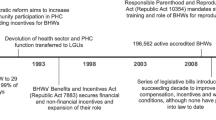Abstract
In-depth structured interviews were conducted with spokespeople for 176 inner-city churches regarding perceptions of existing community problems, number of currently offered church-based social and health programs, and potential interest in church sponsorship of new maternal and child health programs. The sample of respondents represented 78% of the 227 churches located in a low-income, primarily black urban area with 150,000 residents. The typical church participating in the survey was Baptist with a congregation of 100 to 500 people, most of whom were not community residents. The leading community problems identified by the clergy were, in descending order: lack of jobs, teenage pregnancy, gang crime, school drop-outs, and hunger. The perception of community problems matched the church services offered as measured by the number of food and clothing pantries. Few churches had ongoing programs for neighborhood youths. Although many of these same churches expressed interest in expanding services for mothers, adolescents and children, few perceived themselves as having the necessary staff, funds, or technical expertise to conduct such programs.
Similar content being viewed by others
References
Scarlett, W, The Clergyman's role and community mental health.Mental Hygiene, 54:378, 1970.
Lasater, T, Wells B, Carleton R, and Elder J, The Role of churches in disease prevention research studies,Public Health Rep, 101: 125–31, 1986.
Levin, J, The Role of the Black church in community medicine.J Natl Med Assoc, 76:477–83, 1984.
Eng E, Hatch J, and Callan, A, Institutionalizing social support through the church and into the community.Health Educ Q, 12: 81–92, 1984.
Saunders E, and Kong BW, The Role for churches in hypertension management.Urban Health, 12:49–55, 1983.
Hatch J, North Carolina baptist church program.Urban Health, 10:70–1, 1981.
Kong BW, Miller J, and Smoot R, Churches as high blood pressure control centers.Am J Public Health, 71:11–73, 1981.
Perry E, The Memphis church-based high blood pressure program.Urban Health, 10:49–55, 1981.
DePue JD, Wells BL, Lasater TM, and Carleton RA, Training volunteers to conduct heart health programs in churches.Am J Prev Med, 3:51–57, 1987.
Haugk K, Unique contribution of churches and clergy to community mental health.Comm Mental Health J, 12:20–28, 1976.
Kaseman C, and Anderson R, Clergy consultation as a community mental health program.Comm Mental Health J, 13:84–91, 1977.
Hatch J, and Lovelace K, Involving the southern rural church and students of the health professions in health education.Public Health Rep, 95:23–25, 1980.
deVise P, The nation's sixteen poorest neighborhoods. City Club of Chicago, Chicago Regional Inventory Working Paper No. II. 77, 1984.
Additional information
Lynn M. Olson, Ph.D. is Assistant Professor, Center for Urban Affairs and Policy Research. Northwestern University, 2040 Sheridan Road, Evanston, Illinois 60208.
Janet Reis, Ph.D. is Assistant Professor, School of Nursing. State University of New York at Buffalo, Buffalo, New York.
Larry Murphy, Ph.D. is Associate Professor, Institute for Black Religious Research. Garrett-Evangelican Seminary, Evanston, Illinois.
Jennifer H. Gehm, B.A. is Research Analyst, Center for Health Economics Research, Boston, Massachusetts.
This work is supported in part by grants to the Center for Health Services and Policy Research, Northwestern University; The Ford Foundation; The Chicago Community Trust; and The Field Foundation of Illinois. An earlier version of this paper was presented at the Annual Meeting of the American Public Health Association, Las Vegas, Nevada, September 1986.
Rights and permissions
About this article
Cite this article
Olson, L.M., Reis, J., Murphy, L. et al. The religious community as a partner in health care. J Community Health 13, 249–257 (1988). https://doi.org/10.1007/BF01324237
Issue Date:
DOI: https://doi.org/10.1007/BF01324237




